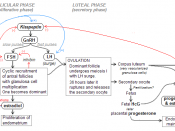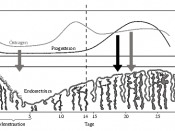Ignorance is bliss, unless it is affecting your health. For years, I have been plagued by a condition called polycystic ovarian syndrome. This was of no great concern to me because I was ill informed of the perils that this syndrome would put me through. Polycystic ovarian syndrome (PCOS) affects up to ten percent of all women, and its effects are extended far beyond the ovaries and the reproductive years (Polycystic 1). PCOS is not recognizable through any one symptom; rather it is a combination of several independent symptoms. These symptoms include obesity, lack of menstrual cycle, male pattern hair loss, acne, hirsutism, infertility, depression, and migraines. There is also a strong connection between PCOS and other medical problems such as insulin resistance, hypertension, dyslipidemia, stroke, and thromboembolism. There are, however, several new and upcoming treatments for PCOS such as, surgical and medical therapies. I hope that one day there will be a definite cure, but for now, any relief from PCOS would be greatly appreciated.
To begin, what is polycystic ovarian syndrome? It is by definition a disorder affecting young women characterized by bilaterally enlarged ovaries with multiple cysts, chronic failure to release ova, secondary absent or scanty menstruation, and infertility (Dox). PCOS was first discovered in 1845 when "sclerocystic" changes of the ovary were described in a French manuscript, however it was not until 1935 that doctors Stein and Leventhal designated the condition polycystic ovarian syndrome (Thatcher 10). In summary, PCOS is over sixty years old and thanks to the combined efforts of a few doctors, it now has a name with a meaning.
Next, we will venture forward to learn more about the effects of PCOS on the body. To start with, there is the presence of obesity in many of the women suffering from...


